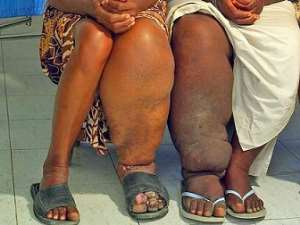
Elephantiasis, also known as lymphatic filariasis, is a condition that features with abnormal accumulation of lymph caused by inappropriate drainage of lymph which leads to huge edemas.
Legs are most commonly affected. Still, other parts of the body such as testicles may be enlarged as well. The skin becomes thicker and the edema can be so huge that impedes the majority of routine activities.
Causes
Elephantiasis can be classified into two groups. The first one includes the disease caused by parasites such as Wuchereria bancrofti, Brugia timori, and Brugia malyai. The other group is non-parasitic elephantiasis.
The parasites which are transmitted by mosquitoes settle in lymph nodes and right there they cause the obstruction in lymphatic drainage. In some cases, the exposure to certain toxic substances may be the cause of elephantiasis.
Symptoms
Elephantiasis presents with relatively obvious symptoms especially if the disease has progressed. Edema and great enlargement of the affected body parts are quite visible.
The skin above the swellings is thick and sometimes due to prolonged friction, there may be skin ulcers present. Increased body temperature is present in some cases.
The enlarged body parts are mostly painless. However, some patient may complain about pain in the affected area. In undeveloped parts of the world, people can get infected by the parasite and they tend not to visit a doctor until the swelling becomes morbidly huge.
Treatment
The basic concept of the treatment is to eradicate all the parasites and their larvae that are present within the body. Albendazole and diethylcarbamazine are medications that are used for this purpose and are efficient in the killing of both in adult forms of the parasite and the larvae.
In some regions of the world, patients are additionally given ivermectin. These medications may have some side effects like increased body temperature pain in muscles and headache. Diethylcarbamazine is additionally helpful in reduction of the enlarged lymphatics.
If under any circumstances a patient develops an allergy on this medication, the therapy will also include corticosteroids and antihistaminics. Even certain medications may be effective in treating elephantiasis. They include doxycycline.
The affected area must be washed and dried and the skin has to be taken care of as there are possible complications such as skin ulcers and secondary skin infection.
If the condition is not caused by the parasite one may be advised to keep away from potential irritants and toxic substances. Elastic bandages may be tightened the extremities hence reduce the swelling.
And finally, elephantiasis of some body parts such as testicular elephantiasis may be surgically treated




 Former Kotoko Player George Asare elected SRC President at PUG Law Faculty
Former Kotoko Player George Asare elected SRC President at PUG Law Faculty
 2024 elections: Consider ‘dumsor’ when casting your votes; NPP deserves less — P...
2024 elections: Consider ‘dumsor’ when casting your votes; NPP deserves less — P...
 You have no grounds to call Mahama incompetent; you’ve failed — Prof. Marfo blas...
You have no grounds to call Mahama incompetent; you’ve failed — Prof. Marfo blas...
 2024 elections: NPP creates better policies for people like us; we’ll vote for B...
2024 elections: NPP creates better policies for people like us; we’ll vote for B...
 Don’t exchange your life for wealth; a sparkle of fire can be your end — Gender ...
Don’t exchange your life for wealth; a sparkle of fire can be your end — Gender ...
 Ghana’s newly installed Poland train reportedly involved in accident while on a ...
Ghana’s newly installed Poland train reportedly involved in accident while on a ...
 Chieftaincy disputes: Government imposes 4pm to 7am curfew on Sampa township
Chieftaincy disputes: Government imposes 4pm to 7am curfew on Sampa township
 Franklin Cudjoe fumes at unaccountable wasteful executive living large at the ex...
Franklin Cudjoe fumes at unaccountable wasteful executive living large at the ex...
 I'll 'stoop too low' for votes; I'm never moved by your propaganda — Oquaye Jnr ...
I'll 'stoop too low' for votes; I'm never moved by your propaganda — Oquaye Jnr ...
 Kumasi Thermal Plant commissioning: I pray God opens the eyes of leaders who don...
Kumasi Thermal Plant commissioning: I pray God opens the eyes of leaders who don...
